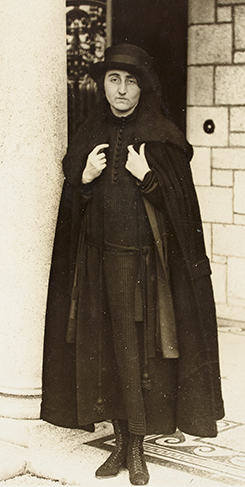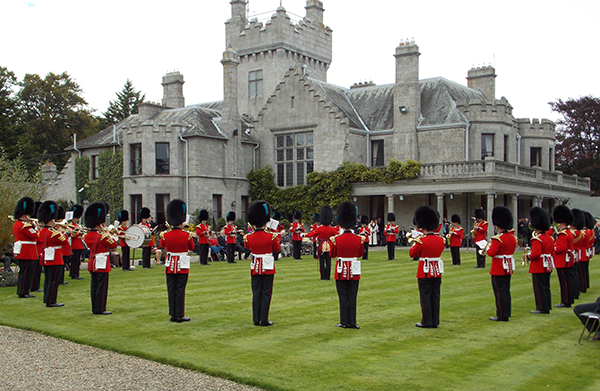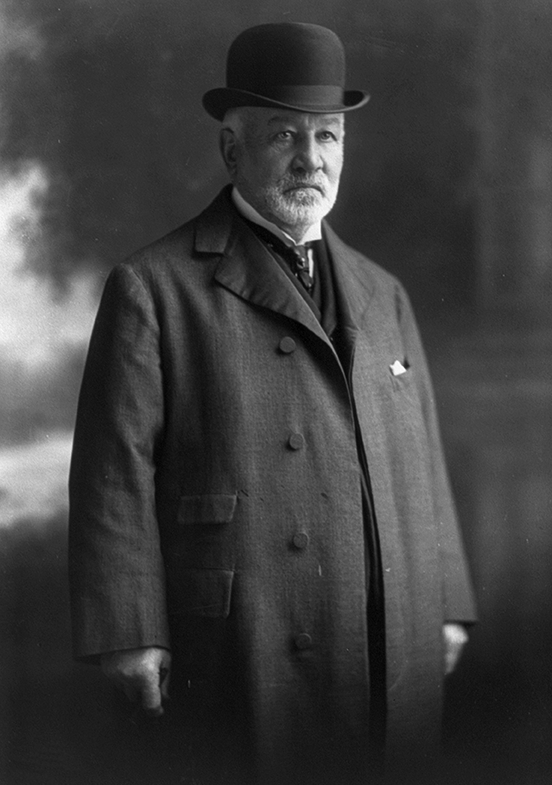‘A NOTABLE PERSONAGE AND A FREEMAN OF THE CITY’—THE FUNERAL OF RICHARD ‘BOSS’ CROKER IN MAY 1922
Published in Features, Issue 3 (May/June 2022), Volume 30By Martin O’Donoghue
The rolling news coverage of Donald Trump’s chaotic presidency and the election of Joe Biden as his successor once again underlined the strength of Irish interest in the United States and its diasporic links. Irish interest in the island’s ties with American politics is nothing new. One of the less remarked events of the revolutionary decade currently being commemorated saw a former boss of New York’s notorious Tammany Hall political machine, Richard Croker, interred in south Dublin in May 1922, with Arthur Griffith and Laurence O’Neill among the pallbearers. The grand affair and the coverage it received at the time underline the fascination with the US and those of Irish heritage—whatever their reputation—but also allow some reflections on politics in Ireland itself.
A FREEMAN OF DUBLIN

Above: Beulah Croker (née Edmondson) in ‘widow’s weeds’ following the death of her husband, Richard ‘Boss’ Croker, in April 1922. (NLI)
Born in Cork in 1841, Richard ‘Boss’ Croker grew up in New York. He worked his way through the murky world of municipal politics (even standing trial for murder in 1874) to reach the top of Tammany Hall in 1886. While he had a modest record as an elected representative, his real power was as head of the Democratic Party’s major machine in the city. As ‘boss’, Croker wielded enormous influence over New York’s political offices and a panoply of patronage networks until his final departure from Tammany in 1902. He retired to England an extremely wealthy man and eventually settled in Ireland, purchasing a property of over 550 acres at Glencairn in south County Dublin. His contribution to horse-racing helped to consolidate a narrative of an Irish emigrant who had done well.
Despite its reputation for corruption, Terry Golway has argued that Tammany fulfilled an important role in lifting Irish immigrants out of poverty. As Carla King noted, after meeting Croker in 1901 Michael Davitt ‘emphasised its [Tammany’s] philanthropic origins’ and defended it against ‘anti-Irish’ prejudices, while acknowledging that ‘many of its nominees to important municipal posts had disgraced the city’ and that Tammany-influenced police officers had ‘accepted bribes and … prostituted their calling as peace officers in shielding breaks and breakers of the law’.
The United States was, of course, an important source of financial support for generations of Irish nationalists, and Croker had been supportive of the Home Rule movement from the 1890s. In 1899 he authorised Tammany Hall’s donation of £3,000 ‘for the purpose of clearing the entire encumbrance now resting upon the Parnell homestead, thus securing the retention of the home in the family’. Such support did not go unrewarded.
In 1907, the year his horse Orby won the Derby, the municipal council proposed offering Croker the freedom of Dublin owing to his ‘unique and distinguished position acquired’ as an Irishman in America, his decision to retire to Ireland and his support for the Irish Parliamentary Party (IPP) and ‘the struggle for home rule’. Party loyalties were reflected in the reaction to the move; it was, according to Ciarán Wallace, a ‘low moment’ for the IPP as it rewarded a ‘major donor’.
One councillor, Alderman Farrell, even attempted to maintain ‘that Mr Croker had purified Tammany and done useful service in New York by defeating the machinations of the British government’. P.T. Daly, however, did not think that Croker had done anything worthy of the honour; nor did Sinn Féin’s Tom Kelly, while Unionist councillors also opposed it. Only fifteen of 80 councillors turned up for the 1908 award, though Lord Mayor J.P. Nannetti was gushing in his praise for a man who, he said, ‘did all he could to elevate and advance the cause of his fellow-countrymen and of Ireland as well’.
CROKER AND THE TREATY
The British press was less warm in its coverage, and by the time of the War of Independence the Daily Mail was keen to report that Croker was ‘likely’ to be helping to fund the IRA. In Ireland, however, the Freeman’s Journal, so long associated with the IPP and owned from 1919 by the wine-merchant Martin Fitzgerald, was more favourable towards Croker. While Croker did not enter Irish politics, the paper reported not just on his equestrian success but also on his efforts to develop his lavish estate at Glencairn. On 24 February 1922, the newspaper even sent a reporter to his residence to report on his ‘remarkable’ recovery from previous illness and to conduct an interview, ostensibly to discuss horses but also to ascertain his views on the current Treaty dispute. Croker was unsurprisingly pragmatic, favouring acceptance and urging that a ‘settled Ireland’ would reassure investors, who would traverse the Atlantic to boost the Irish economy.
Croker maintained that American opinion was in favour of the settlement and told the Freeman that Collins was ‘one of the greater Irishmen’ he ever met, while Griffith was ‘a marvellous organiser, a deep thinker, and the possessor of a wonderful brain’. By contrast, he described de Valera as an ‘upright, able Irishman, but too prone to look back instead of forward’. A subsequent commission examining his domicile in March 1927 heard evidence that Croker had sought Free State citizenship from Collins and Griffith the previous month. Cumann na nGaedheal minister J.J. Walsh even told the same commission that Croker had agreed to stand for the Dáil for Dublin County prior to his death.
THE DEATH OF THE ‘BOSS’
As it turned out, the Freeman interview proved to be Croker’s last public intervention. He passed away on 29 April, sparking headlines on both sides of the Atlantic, as well as plans for a high-profile funeral in Dublin. Tributes and messages of condolence came in from Charles Alexander, chairman of the National Democratic Club, Lord Mayor Laurence O’Neill, Eamon de Valera, Sir Horace Plunkett, Nationalist MP Jeremiah MacVeagh, and Sir Bryan and Lady Mahon.
Newspaper obituaries focused on the concept of the political ‘boss’, exhibiting descriptions rooted in paradigms of traditional masculinity—something reinforced by Tammany’s reputation for brooking little opposition, as well as the street-fighting backgrounds of many Irish-American politicians (Croker included).
In the US the New York Times, a long-time opponent of Tammany Hall, reported on his passing in his ‘Irish castle’, recounting his career as ‘gang leader, prize fighter, alderman, coroner’ before his rise to the top of Tammany. For the Times, however, his ‘great native ability’ could not overshadow his ‘evil’ leadership. The Washington Post agreed that Croker was the ‘sinister personification of corrupt government’, and his success lay in the ‘idolatry’ that he inspired among many in New York City. The Boston Daily Globe noted Croker’s ability to perceive an opening in the political system ‘quite unintended by the founders of our institutions’.
The British press wasted little time in pointing to Croker’s record of corruption. The Daily Express added a little anti-Catholic flourish, noting that ‘we have no such supreme pontiffs of political jobbery over here. He was as autocratic as any Czar and while he was in power every dope den in New York paid him toll. He was a cruel man, ruthless to his enemies, and kind to his friends and on occasions charitable.’ The Express went on to claim that he was ‘completely illiterate’ and a ‘bitter enemy of Great Britain’. The liberal Manchester Guardian’s account was more detached but added that his ‘personal responsibility for New York’s misrule is beyond doubt’ and that he ‘shared personally in the prosperity of his associates’.
IRISH TRIBUTES
Irish responses by contrast focused on the depiction of Croker as a strong, silent and successful son of Ireland. Dublin Corporation, on the motion of the lord mayor, recorded its sympathies and sent condolences to Croker’s widow, Beulah Edmondson, on the passing of a ‘notable personage and a freeman of the city’. While the Irish Times provided a largely colourless obituary, the Irish Independent was positive, and the Freeman’s Journal recounted the end of ‘one of the most romantic and much-discussed careers in the modern politics of the United States’.
Dealing with his rise through Tammany, the Freeman noted that he ‘held undisputed sway as its greatest chief and as practical dictator of the affairs of the great city of New York’. The paper added that ‘various efforts were made to upset him, and most serious and unscrupulous charges of corruption were made against him, but these he always faced with courage and spirit, and defeated them’. The Freeman admitted that ‘many’ of the charges against Tammany were ‘no doubt well grounded’, but that it had been ‘more efficient’ in administration than its opponents, ‘and especially this was the case during the days of Mr Croker’s predominance’. The piece was completed with an account of his horse-racing interests and charitable donations, including to Catholic churches at Sandyford and Glencairn.
The Boston Daily Globe had observed that ‘a boss is always an outstanding figure, rude and rugged, thick-skinned, indomitable, a man of iron will, who keeps his promises, rewards his friends, and punishes his enemies’, and IPP MP T.P. O’Connor very much recalled Croker in terms of an alpha male. In the Daily Telegraph, O’Connor told of an American friend who called Croker the ‘silent Napoleon’ and noted Croker’s taciturn nature throughout a dinner they shared at Westminster, writing that he did not speak at all during the meal and that ‘his face might have been that of a prize fighter …—grim lips tightly pressed together, with heavy brow, closely cropped beard, a face impassive, vigilant and self-contained and a figure rugged, strong thickset he certainly looked the part’. O’Connor also commented on the persistence of Croker’s Irish accent—‘it was strange to hear this man after he had uttered some phrase that struck you as Napoleonic in its vision and its audacity and had given other indicators of natural genius in the governing of men stray into such phrases as “thim min”, the last in Irish want of grammar and correct pronunciation’.
FUNERAL AND REPUTATION
Croker’s funeral itself was delayed, as the bronze casket ordered was available only in England, and did not take place until 5 May 1922. He was entombed at Glencairn after a ceremony in Dublin Castle’s Chapel Royal attended by eight priests, along with Revd Kelly of Sandyford, Bishop Miller of Eumenia, South Africa, and clerical students who lit tapers on the procession to the mausoleum. Newspapers reported that his coffin received a salute from a ‘soldier of Dáil Éireann’. Anti-Treaty TD Joseph McDonagh was an honorary pallbearer, along with Oliver St John Gogarty, Arthur Griffith and the lord mayor, while the ‘practical pallbearers’ included the bloodstock owner J.J. Parkinson. Michael Collins was represented at the funeral by Kevin O’Shiel, while others in attendance included Martin Fitzgerald, James MacMahon, undersecretary to the lord lieutenant, and Maud Griffith, as well as friends and family of Croker.

Above: The Irish Guards’ Band in October 2012 at the British ambassador’s residence, Glencairn House, Sandyford, Co. Dublin, Richard ‘Boss’ Croker’s ‘Irish castle’ (according to the New York Times) until his death on 29 April 1922. (IrishGuardsBand)
Such a distinguished attendance said much about the willingness to mark the passing of the emigrant turned political boss who had joined the upper echelons of Irish society in his retirement. It also, however, raised some ironies. Fifteen years earlier, Sinn Féin members of the municipal council had disputed the granting of the freedom of the city to Croker. In the intervening period, opponents had often accused the IPP of jobbery and mocked its capacity for strong organisation, developed over decades of activism. Clearly, however, the wealth that Croker acquired dwarfed that of any nationalist politician in his lifetime. Yet, in the delicate period between Treaty and Civil War, all sides were ready to acknowledge Croker’s importance and to pay their respects.
It was not an attitude that has persisted down through the decades, and the names of Croker and Tammany have sometimes become rhetorical devices to explain the propensity of Irish politicians and parties to flout standards in public office. In 2003 a Fianna Fáil councillor in Dún Laoghaire–Rathdown proposed a plaque to Croker at Glencairn for his service to horse-racing only to draw swift condemnation from Labour’s Aidan Culhane, who likened Croker to former taoiseach Charles J. Haughey. Then, as now, connections between American and Irish politics were never far from the public mind.
Martin O’Donoghue teaches British and Irish history at the University of Sheffield.
Read More:
‘BOSS’ CROKER AND TAMMANY HALL
Further reading
T. Golway, Machine made: Tammany Hall and the creation of modern American politics (New York, 2014).
C. King, Michael Davitt after the Land League, 1882–1906 (Dublin, 2016).
C. Wallace, ‘“A rather mild sort of rebel”: J.P. Nannetti, lord mayor of Dublin 1906–08’, in R. McManus & L.M. Griffith (eds), Leaders of the city: Dublin’s first citizens, 1500–1950 (Dublin, 2012).

















